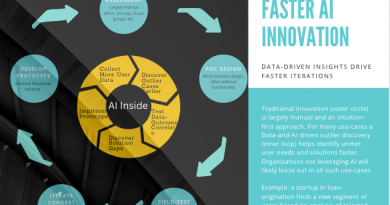Is Apple Still Innovating
Is Apple Still Innovating?
What recent announcements say about Apple’s innovation index?
Deepam Mishra

Admission: I am an Apple acolyte
Let me start with an admission. I have been an Apple fan for years and likely will stay forever. Whenever I pay for an Apple product, I feel like I bring a piece of Steve Job’s legacy home. However let me be honest. I do not see the same Apple today, as I used to. The recent product announcements and analyst coverage, seem to reinforce this feeling. I’d like to hear what you feel (especially, if you are like me)?
Is Apple Still Synonymous With Innovation?
Let us start with an honest question to ourselves: What do you consider the last, big innovation from Apple? When did it occur?

For me it has to be the original iPhone and to a lesser extent, my 13″ MacBook Air. I feel that Apple’s Second Innovation Age ended in 2010, after a flurry of 4 industry-making innovations, viz. the iMac, the iPod (including the unique business model), the iPhone, and the iPad. Since 2010, no Apple announcement has really got me excited to that scale.
How Innovative Are Apple’s Recent Inventions?
Apple’s recent marketing and shareholder literature, shows a long list of high voltage announcements. Look at the list below and share which curve these technologies seem to be tracking?

- ARM SOC: Apple’s in-house ARM-based Systems-on-Chip (SoC) enabled simultaneous improvements in performance and battery life compared to all Intel options. That is a big upgrade. However, if it had not happened, would Apple’s sales have plummeted? Or has it substantially changed the revenue trajectory for Apple? No one knows, but whats your guess?
- iPad Pro: Apple made several amazing upgrades to the iPad Pro. Examples: the Mini LED, the iPadOS operating system and the Magic Keyboard. However, ask yourself honestly if you bought any of those iPads mainly for these reasons and/or if you’d have purchased another brand but for for these features?
- Ok, how about Apple Silicon for Macs — consider the same questions as before
- Surely, the AirPods have been an amazing, non-linear success story. One analyst told me that AirPods alone would have made an independent company a F500!. But frankly while I like them, I am not in LOVE with them like I was when I got the first iPad or iPhone. I always feel they are overpriced, but have no option because of Apple’s annoying “closed” ecosystem. And oh by the way, if it were a path breaking innovation, would it not have captured a big part of the Android market?
Did Apple Shoot High Enough In Its Visible Failures?
How many of these are high-leap attempts? And honestly, how many were you even aware of?

- AirPower: AirPower was pre-announced with much fanfare, but never released. This is highly unlike Steve Jobs style of keeping announcements secret, and then show off the new product, with over-the-top fanfare, at a glitzy launch event. Seems weird, eh?
- HomePod: The Apple I remember, would rather not do business, than be a follower. The story of Apple’s Siri purchase is related like a fairy-tale in the company I used to work for (which invented the core technology, but needed Steve to make it revolutionary). Steve Jobs personally led the enquiry and negotiations, and is said to have come and waited in our lobby just to meet the inventors. In spite of their early start, Apple seems to have lost the way with Siri. With the HomePod, Apple tried to catch up to Alexa and Google, but forced to pull back. From what I understand, the production has completely stopped, and Apple only sells the HomePod Mini.
- AirTags are new and are yet to prove themselves.
- Apple Pro Display XDR is facing a huge pushback. The market feels it is too overpriced to justify the value. Steve Jobs would charge a high fee, but made the value even higher. The Pro Display does not do it for me.
- Apple Watch and Apple TV have gained some degree of success. But would you put them in the same league as the others?
But, Do Shareholders Care? After all, its still worth $3T!

I still own Apple stock, but am wondering if we are in the harvesting stage of the innovation curve, or is there still another big act or two left.
Looking at the most recent financials, majority of Apple’s profits seem to be coming from software and subscription services. It may sound great, but which of these are Apple innovations? I read a report today that Apple seems to copy some of the best grossing apps on its Appstore, and introduce them as features. Think of ApplePay and new features like Buy-now-pay-later (pioneered by Affirm, Klarna, Afterpay and a few more) or TapToPay (any resemblance to Square or Toast?). While shareholders may be happy looking the other way, making margins, I feel for the startups. And I feel even more for what this may do to our country’s innovation culture longer term. Too much power in very few hands, perhaps?
So, while my optimistic side is hoping to see Apple’s forays into solving some hard problems like healthcare or sustainability, my cynical side feels that the current management is largely focussed on milking their dominant market share, a walled-garden ecosystem and generations of unsuspecting acolytes like me.
Has The Culture Changed? If so, Why?
Imho, it is a complex question to answer, especially because Apple is such a secretive company. In a large enough business like Apple, would it be naive to say that the culture has changed without one (very important!) man? I wrote a whole article on the Top-5 Corporate Innovation Failures, and see many of them reflected in Apple’s recent announcements. Read my views here. But I’d like to hear your pov and predictions?
Conclusions:
I would love to hear your perspectives




